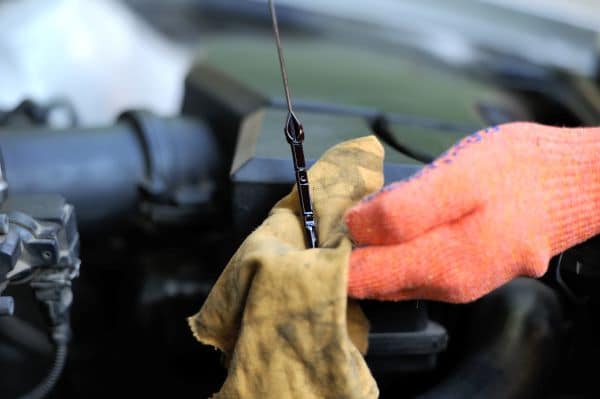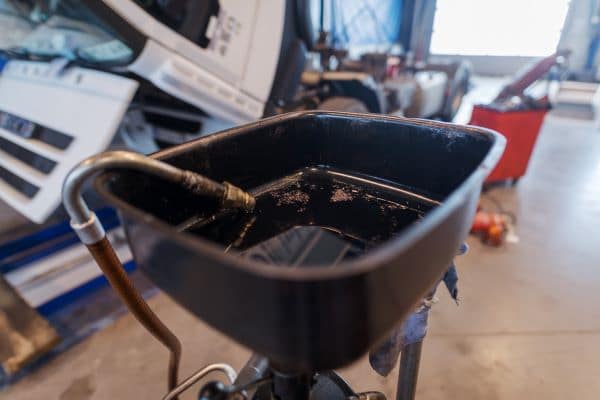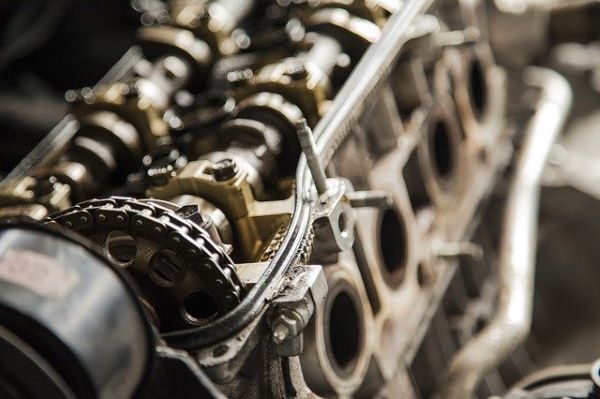It can be difficult figuring out what maintenance is important for your vehicle. Whether it is a wheel alignment or an air filter change, every service appointment has a purpose. However, nothing is more basic than performing a regular oil change. If you neglect this essential maintenance task, you could end up with metal shavings in the oil.

We look at what to do with metal in oil, the symptoms it causes and how you can prevent it. Whether you are dealing with metal in oil pan or metal shavings in oil filter, you need to read our guide for more help.
Table of Contents
What Does Metal Shavings in Oil Mean?
Motor oil is the lifeline to your car or truck engine. The motor is full of moving parts that need proper lubrication to work properly. Without this lubrication, the moving components are going to rub together, causing friction that will wear out the engine.
As the pistons move in the engine, metal flakes in oil might be present over time. If this happens, the oil filter should catch the shavings. However, it is not perfect, and you might end up with fine metal shavings in oil. This is why you need to change the motor oil and oil filter regularly.
Signs of Metal in Oil
While you might catch the metal shavings in oil pan during a regular change, you can also pay attention to these symptoms that something is wrong.
Rough Idle
When the engine doesn’t have the right amount of lubrication, unnecessary friction occurs with the motor’s components. You might experience more shaking or vibration while idling, which is a sign that the oil needs to be changed.
Ticking Sound
As you get metal in the engine oil, the liquid cannot flow as smoothly. This problem also leads to a lack of lubrication. When the parts are lubricated, a ticking sound can be heard. With an oil change, the ticking should be reduced.
Knocking Sound
A buildup of contaminants in the motor oil can also lead to excess friction. If the motor oil is heavily contaminated, it could cause the engine to knock, which is a serious sign that something is wrong.
Lack of Engine Power
When the engine fails to perform normally, it can be caused by a multitude or problems. However, you should never underestimate the effect that contaminants can have on the motor oil.
Warning Lights
Your vehicle has sophisticated sensors to alert you when there is a problem. Whether you see a Check Engine Light, the Service Engine Soon sign or another warning, you want to pay attention. By taking care of the problem quickly, you might be able to avoid costly engine repairs.

Types of Metal Flakes in Oil
What do fine metal shavings in oil mean? It depends on what type of metal shavings they are. We look at several types you might be dealing with.
Brass, Copper or Bronze Oil Shavings
If the metal particles in engine oil are one of these colors, there could be a worn-out bearing or bushing in the engine. Wrist pin bearings, turbo thrust bearings, camshaft bearings and the crankshaft bearings will all contaminate your oil with this color shaving.
Additionally, defective rod bearings can leave behind steel shavings that are copper. The first layer of the rod bearing is steel, while the second is made from aluminum. When you get to copper, you’ve reached the third layer, indicating that the damage is severe.
Chromium and Molybdenum Oil Shavings
Typically, this type of metal shaving is related to a piston ring or piston defect.
Aluminum Oil Shavings
When the camshaft caps or overhead camshaft bearings wear out, you might see aluminum metal shavings in the oil.
Iron Shavings
Iron metal in oil can be discovered with the help of a magnet. When the magnet draws the particles from the oil, you know they are iron. This contamination comes from the crankshaft, camshaft and valve train components. It could also be caused by a turbocharger defect.
How to Prevent Metal Flakes in Oil
The best way to deal with metal in oil is to prevent it in the first place. Here are some tips to keep your car engine running the way it should. Here are a few tips to ensure you don’t have to deal with excessive contamination of the motor oil.
Check the Oil
You should check the oil often to ensure there is enough in the engine and that it looks clean. If the engine oil is dark and dirty, it’s time to replace it. If you notice metal in the oil, you need to have it looked at.
Choose the Right Oil
You must use the right oil viscosity to ensure there are no metal shavings in oil filter. By using the appropriate oil, you ensure that the engine wear is reduced. Your car engine is made for a particular type of oil, so you want to find out what it is by checking the owner’s manual. If you use something incompatible, you face a higher chance of causing wear and creating metal shavings.
Perform Regular Oil Changes
The motor oil requires regular changes to ensure the contamination doesn’t build up and cause more wear. Don’t wait until you see metal in the oil to change it. Instead, follow the recommended service schedule to ensure the oil is always fresh.
Some conventional oils require changing every 3,000 miles, while many synthetics can go up to 10,000 miles. However, if you push your engine hard through towing or driving in extremes, you might need to change the motor oil more frequently.
Follow All Recommended Service Schedules
Even when nothing is going wrong with your car or truck, you want to service it. Every vehicle has a recommended service schedule that should be followed perfectly. This guideline was written by the automaker, the same people that know what your vehicle needs to run its best.
With proper maintenance, you ensure every system on your car runs the way it should. After all, prevention is always better than treatment. The cost of doing regular oil changes and tune-ups is nothing compared to needing a complete engine replacement. You don’t want to deal with this expensive repair.
When you follow the recommended service schedule, you provide a form of insurance over the valuable components of your car, including the engine.

Do I Need a New Engine Because of Metal Shavings in Oil Filter?
While it’s hopeful to think that repairing the issue causing the metal shavings is simple, that’s not usually the case. If you leave the problem to get worse, it will only become more costly to fix. Additionally, without the right maintenance, you might not recognize there’s a problem until it is too late.
The only way to know for sure what repair needs to occur is by taking the vehicle to a qualified mechanic. A trained technician can check to see what damage has been done. While you see metal shavings, these contaminants aren’t the problem. Instead, they are simply a symptom of something larger. In some cases, a part of the engine can be replaced to stop the metal shavings from occurring. Other times, a complete engine rebuild will be required.
If you need a new or rebuilt engine, you are looking at an extensive repair that will cost plenty. For most cars, you will have to pay at least $2,500, but it could be much more than that. It just depends on what kind of damage was done and what parts need to be replaced.
In some cases, it might not be worth replacing the engine at all. If you drive an older car, the cost of an engine might be more than the vehicle is worth. Plus, if your engine had 150,000 miles on it, so do the other systems, which are probably ready to fail as well.
An engine rebuild or replacement is a complicated job that should only be done by a qualified technician. Make sure you get multiple quotes before choosing someone to do the job.
Conclusion
Now that you know what causes metal shavings in oil, it’s time for you to take charge of your car’s engine health. By regularly changing the oil and paying attention to strange symptoms, you can ensure that your car, truck or SUV continues running perfectly for many miles to come. It doesn’t take a lot of work to maintain a vehicle, but it is a nightmare to fix problems that were caused by neglect.
